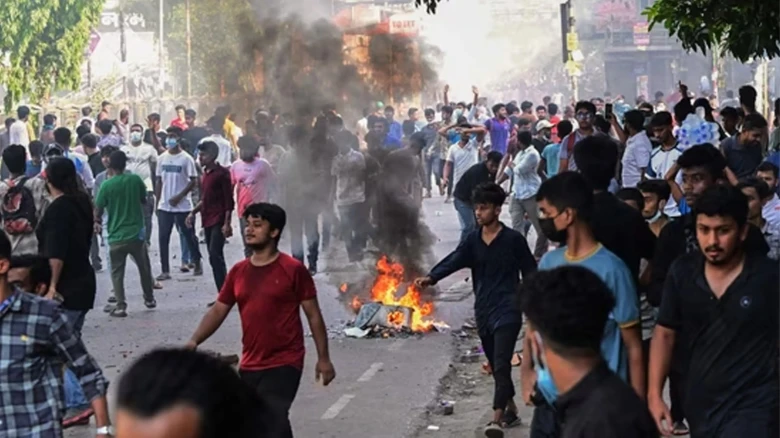The protests began last month after the Bangladesh High Court reinstated a quota system for government jobs...
Digital Desk: At least 32 people have been killed and over 2,500 injured in Bangladesh as violence escalates during student protests demanding quota system reform for government jobs. The protests took a turn for the worse on Thursday when demonstrating students set fire to the country's state broadcaster, just a day after Prime Minister Sheikh Hasina appeared on the network seeking to calm the escalating clashes.
For weeks, hundreds of university students in Dhaka and other cities have been holding rallies, protesting the system of reservation in public sector jobs. This includes reservations for the relatives of war heroes who fought for the country's independence from Pakistan in 1971.
What Triggered the Bangladesh Protests?
The protests began last month after the Bangladesh High Court reinstated a quota system for government jobs, overturning a 2018 decision by Prime Minister Sheikh Hasina's government to scrap it.
However, the Supreme Court suspended the High Court's order after the government's appeal, setting a date of August 7 to hear the government's challenge. The demonstrations escalated when Sheikh Hasina refused to meet the students' demands, citing court proceedings.
This week, the situation turned violent following clashes between thousands of anti-quota demonstrators and members of the student wing of Hasina's Awami League party. The police resorted to using rubber bullets, tear gas, and noise grenades to disperse the protesters, but these measures failed to quell the unrest.
Impact of the Violence
The escalating violence prompted authorities to shut the metro rail inside the capital and suspend railway services to and from Dhaka since Thursday afternoon. The government also ordered the shutdown of mobile internet networks across several parts of the country. According to outage monitor Netblocks, Bangladesh experienced a "near-total internet shutdown."
Earlier on Thursday, the Bangladesh police website was inaccessible, and the website of the ruling Awami League’s student wing, Bangladesh Chhatra League, was hacked, reported PTI. In response to the escalating protests, the Bangladesh government has also ordered the indefinite closure of schools and universities.
What Are the Students Demanding?
The protesting students are demanding an end to a quota system that reserves more than half of government jobs for specific groups, including children of veterans from the country's 1971 liberation war against Pakistan.
Understanding the Quota System
The quota system in Bangladesh has undergone several changes since it was introduced in 1972. The system covers groups such as freedom fighters' families, with women and those from underdeveloped districts receiving a share of a tenth each. Five percent is allotted to Indigenous communities, and one percent to the disabled, reported Reuters. When the system was abolished in 2018, reportedly, 56 percent of government jobs were blocked under various quotas.
The protesting students argue that the quota system reduces the number of government jobs open to all, adversely affecting aspirants who seek jobs based on merit.
Government's Response
On Thursday, Bangladesh Law Minister Anisul Huq expressed willingness to hold talks with the protesting students after fresh violence erupted across the country. “Whenever they agree, we will sit... it could be held this (Thursday) afternoon even… Government has agreed to hold talks with the quota reformists,” he said, as quoted by PTI.
Meanwhile, Prime Minister Sheikh Hasina condemned the loss of lives and called for patience until the Supreme Court delivers its verdict. Her appeal, however, has done little to quell the unrest.
As Bangladesh grapples with this crisis, the government's response and the court's upcoming decision will be crucial in determining the future of the quota system and the nation's stability. The situation remains tense, with the potential for further violence if a resolution is not reached soon.








Leave A Comment